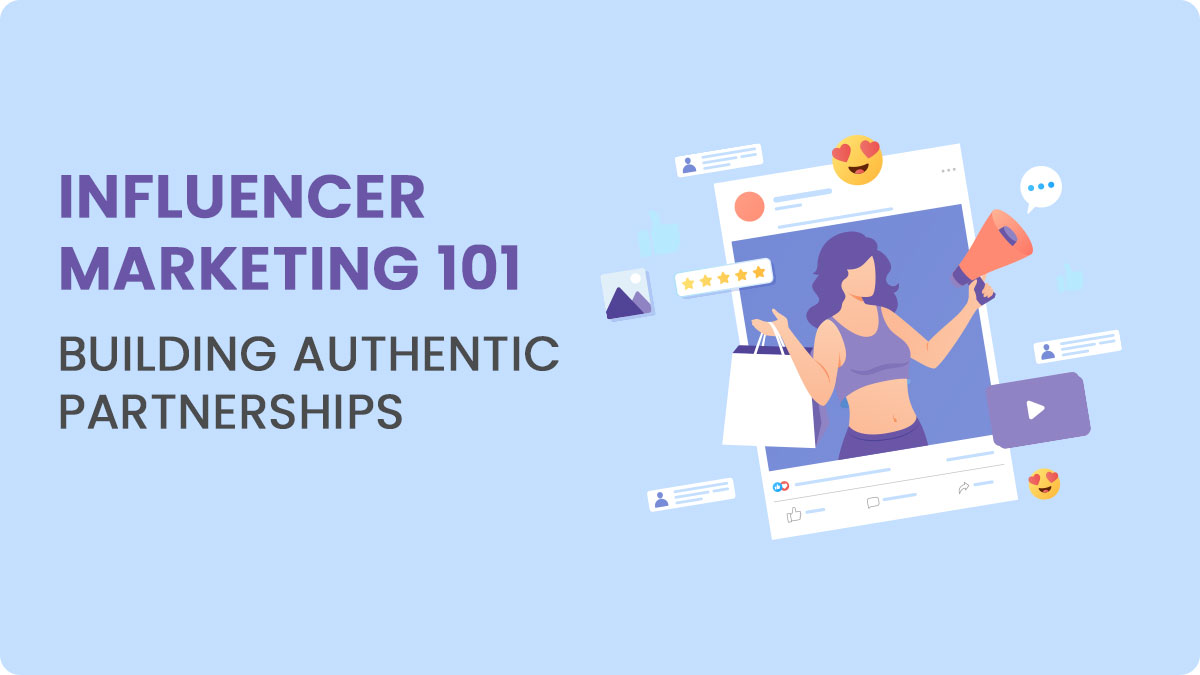In the ever-evolving landscape of digital marketing, one strategy has risen to prominence over the past decade, fundamentally transforming the way brands connect with their target audiences. Influencer marketing has emerged as a dynamic and influential tool for businesses to promote their products and services. However, the success of influencer marketing hinges on the ability to build authentic partnerships with the individuals who hold sway over niche communities and vast online followings. In this article, we’ll delve into the world of influencer marketing, offering insights into how to create genuine and mutually beneficial relationships with influencers.

Let us first understand the meaning of Influencer Marketing
Influencer marketing is a digital marketing technique that involves working with people who have a large and active following on social media or other online platforms. These individuals, known as influencers, have built a loyal audience based on their expertise, personality, or niche interest, and they can influence the purchasing decisions and opinions of their followers.
In influencer marketing, brands and businesses partner with these influencers to promote their products, services, or messages to the influencer’s audience. The goal is to leverage the influencer’s credibility and reach to reach a target demographic more effectively and authentically than traditional advertising methods.
Examples of some of the most successful Influencer Marketing
Influencer marketing has become a prominent strategy in various industries, and there are countless examples of successful influencer marketing campaigns. Here are some notable examples:
Daniel Wellington and Micro-Influencers: The watch brand Daniel Wellington leveraged micro-influencers (those with a smaller but highly engaged following) to promote their watches on Instagram. They sent free watches to these influencers, who then created stylish posts featuring the products. This strategy helped Daniel Wellington gain significant brand exposure and boost sales.
Coca-Cola and Selena Gomez: Coca-Cola partnered with pop star Selena Gomez for their “Share a Coke” campaign. Selena’s social media posts featuring personalized Coca-Cola bottles with her name and song lyrics garnered millions of likes and shares, creating buzz around the brand and campaign.
Fashion Nova and Cardi B: Fashion Nova, an online fashion retailer, collaborated with rapper Cardi B, who was already a fan of the brand. Cardi B promoted Fashion Nova’s clothing through her social media channels and even launched her own collection with the brand, resulting in significant sales and brand recognition.
Dove and Real Beauty Campaign: Dove’s “Real Beauty” campaign featured real women as influencers to challenge traditional beauty standards. This campaign focused on self-esteem and body positivity, creating a powerful and lasting message that resonated with their target audience.
GoPro and Adventure Influencers: GoPro regularly collaborates with adventure and outdoor enthusiasts who use their action cameras to capture their thrilling experiences. These influencers create exciting content that showcases the capabilities of GoPro cameras while inspiring their followers to live an adventurous lifestyle.
Read more: The Art of Composing Engaging Social Media Captions
The Rise of Influencer Marketing
Before diving into the nuances of building authentic partnerships, let’s take a moment to understand why influencer marketing has gained such widespread prominence.
Trust and Authenticity: One of the primary reasons influencer marketing has become a force to be reckoned with is trust. Audiences tend to trust influencers more than traditional advertisements. These influencers often have a personal connection with their followers, and their endorsements carry weight.
Niche Appeal: Influencers often belong to specific niches or communities. They have a deep understanding of their niche and a dedicated following. This makes them invaluable for businesses targeting specific demographics.
Content Creation: Influencers are content creators by nature. They produce high-quality, engaging content that can be seamlessly integrated into a brand’s marketing strategy.
Amplified Reach: Collaborating with influencers can significantly extend a brand’s reach. Their followers become aware of your products or services, and this exposure can lead to an influx of new customers.
The Authenticity Imperative
In the realm of influencer marketing, authenticity is king. Audiences are quick to detect inauthentic partnerships, which can harm both the influencer’s credibility and the brand’s reputation. To ensure the success of influencer marketing campaigns, authenticity should be at the core of your strategy. Here’s how to build authentic partnerships:
Research and Selection: Begin by conducting thorough research to identify the right influencers for your brand. Look for individuals whose values align with your company’s mission. It is not only about the numbers; it is also about significance. Micro-influencers with smaller followings can sometimes offer more authentic connections with their audience.
Engage with Genuine Fans: It’s not just about engaging with influencers but also with their followers. Interact with the influencer’s audience through likes, comments, and shares. This shows that you genuinely appreciate their community and are not just there for a one-off promotional campaign.
Clear Communication: Transparency is key. Be clear about your expectations, goals, and what you’re offering in return. Ensure the influencer knows your brand inside out and is genuinely interested in your products or services.
Creative Freedom: Give influencers creative freedom. They are the most familiar with their target demographic and understand what type of content will appeal to them. Overly scripted content may appear insincere.
Long-Term Partnerships: Authenticity often flourishes in long-term partnerships. Building a relationship with an influencer over time can result in more genuine endorsements and a deeper connection with their audience.
Disclosure and Compliance: Ensure influencers comply with disclosure guidelines and regulations in their region. Honesty about sponsored content is not only a legal requirement but also fosters trust.
Measuring Success
To determine the success of influencer marketing, you need to set clear goals and key performance indicators (KPIs). These can include:
Engagement Metrics: Measure likes, comments, shares, and overall engagement with the influencer’s content.
Traffic and Conversions: Track the traffic and conversions generated through the influencer’s posts or videos.
Brand Sentiment: Monitor the sentiment surrounding your brand and campaign to assess whether it’s positive or negative.
Sales and Revenue: Ultimately, the impact on your bottom line is a critical measure of success. Analyze the increase in sales and revenue attributed to your influencer marketing efforts.
Audience Growth: Evaluate how your brand’s social media following and email list subscribers have grown since partnering with influencers.
Read more: The Effectiveness of Visual Storytelling in Social Media Marketing
Influencer Marketing: A Sustainable Strategy
Influencer marketing is not a fleeting trend; it’s a sustainable strategy that, when executed authentically, can yield impressive results. Brands need to recognize the significance of building genuine partnerships with influencers to fully harness the power of this approach.
As the digital landscape continues to evolve, influencer marketing will adapt alongside it. The key to success lies in understanding the shifting dynamics of social media, audience preferences, and influencer behavior. By staying agile and embracing authenticity, your brand can create meaningful, long-lasting relationships with influencers, ensuring continued success in the world of digital marketing.
